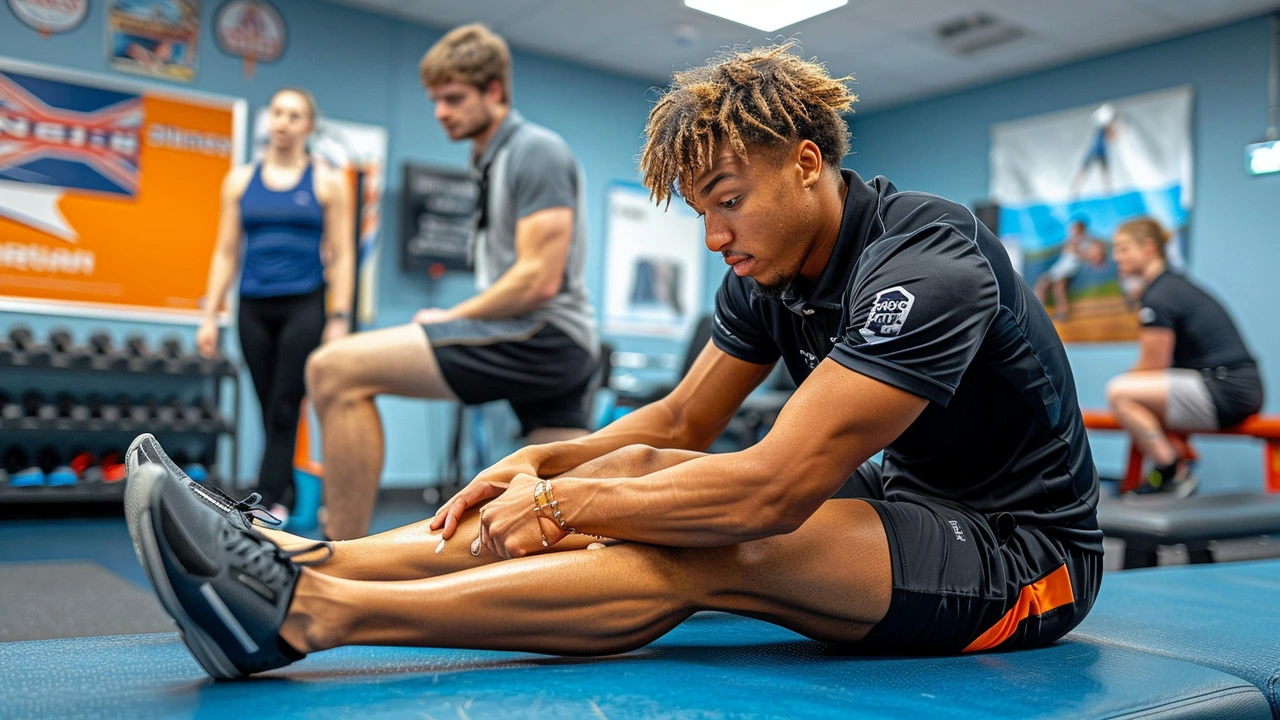When it comes to enhancing your fitness journey, sports massage can be a game changer. This specialized form of massage is designed to help athletes and fitness enthusiasts recover faster, improve performance, and prevent injuries.
The process focuses on manipulating the muscles, tendons, and ligaments to alleviate pain, reduce stress, and promote overall well-being.
Read on to discover how sports massage can benefit your fitness routine and tips on how to make the most out of it.
Understanding Sports Massage
Sports massage is a type of therapeutic massage specifically tailored to the needs of athletes and fitness enthusiasts. It goes beyond traditional massage techniques by focusing on the prevention and healing of injuries to the muscles and tendons. This form of massage employs various techniques including deep tissue work, stretching, and trigger point therapy to address specific areas of concern and improve overall muscle function.
One of the key benefits of sports massage is its ability to enhance muscle recovery. After an intense workout, your muscles might feel sore due to micro-tears that occur during the exercise. Sports massage aims to reduce this soreness and accelerate the healing process by increasing blood flow to the affected areas. This enhanced circulation brings oxygen and nutrients that are essential for muscle repair and helps in removing metabolic waste products such as lactic acid.
Another important aspect of sports massage is its role in injury prevention. By reducing muscle tension and improving flexibility, this type of massage helps in maintaining optimal muscle condition, thus minimizing the risk of injuries. It's particularly beneficial for athletes who engage in repetitive or high-intensity activities. Tight muscles can lead to strains, sprains, or other injuries, but regular sports massage can keep the muscles supple and resilient.
Interestingly, sports massage is not only limited to professional athletes. Even if you're a casual gym-goer or a weekend warrior, you can reap the benefits. In fact, incorporating sports massage into your routine can make a significant difference in your fitness journey. According to a study published in the Journal of Sports Medicine, individuals who received regular sports massage reported decreased pain and improved range of motion.
"Sports massage can be a vital component of an athlete's regimen, contributing to faster recovery, better performance, and reduced injury risk," says Dr. James Buckley, a renowned sports physician.
Sports massage also has a mental component. It promotes relaxation and stress reduction, which are important elements in any fitness program. By providing a sense of physical and mental relief, sports massage can help you stay motivated and focused on your fitness goals. The therapeutic touch involved in the process releases endorphins, the body's natural painkillers, which can enhance mood and create a feeling of well-being.
To get the most out of sports massage, it's important to work with a trained and experienced therapist who understands the nuances of sports-related injuries and recovery. They will tailor the techniques to your specific needs and ensure that the massage provides maximum benefit. Whether it's a pre-event massage to prepare muscles for activity, a post-event massage to aid recovery, or a regular maintenance massage, knowing when and how to incorporate the treatment into your schedule is essential.
Finally, understanding the different techniques used in sports massage can help you appreciate its benefits. Techniques such as effleurage, which is a light stroking movement, are used to warm up the muscles. Petrissage, involving kneading and squeezing, helps in breaking down muscle knots and improving flexibility. Deep tissue massage targets deeper layers of muscle tissue to alleviate chronic tension and discomfort. By combining these techniques, a sports massage therapist can address various aspects of muscle health and contribute significantly to your fitness journey.

Benefits for Muscle Recovery
When you're dedicated to a fitness regimen, muscle recovery is crucial. Engaging in intense workouts without proper recovery can lead to muscle fatigue, soreness, and even injuries. One effective way to enhance muscle recovery is through sports massage. This technique involves targeted pressure on muscles to improve blood flow and aid recovery.
One of the main benefits of sports massage is that it helps reduce muscle tension. During intense physical activity, muscles can become tight and rigid. A sports massage promotes relaxation by relieving this tension, allowing the muscles to repair and rebuild efficiently. This means less soreness and a quicker return to your fitness routine.
Another advantage of sports massage is its ability to break down scar tissue. When you experience small muscle tears, your body builds scar tissue during the healing process. If not managed, this scar tissue can limit muscle flexibility and cause discomfort. Sports massage helps to break down scar tissue and keep your muscles flexible.
An interesting fact is that sports massage can significantly improve circulation. By stimulating the flow of blood, massages ensure that oxygen and necessary nutrients reach the muscles more effectively. This helps to speed up the removal of toxins and metabolic waste products, reducing muscle fatigue and aiding in efficient recovery.
In a study published in the Journal of Athletic Training, researchers found that athletes who received regular sports massages experienced a noticeable reduction in delayed onset muscle soreness (DOMS) compared to those who did not. This shows that incorporating sports massage into your routine can help you stay on top of your game without enduring unnecessary pain.
As Dr. Michael Clark from the National Academy of Sports Medicine says, "Regular sports massages can contribute to maintaining peak physical condition and reducing the risk of injuries sustained through rigorous physical activities."
Sports massage also plays a role in reducing inflammation. After an intense workout, muscles can become inflamed as part of the body's natural healing response. Massage techniques, such as kneading and compression, help to lower inflammation levels, accelerating the healing process and allowing for quicker recovery.
Moreover, sports massage can improve your mental well-being. The physical touch and pressure applied during a massage can trigger the release of endorphins, the body's natural painkillers. This not only helps alleviate pain and discomfort but also promotes a sense of relaxation and stress relief, contributing to better mental health.

Injury Prevention
Incorporating sports massage into your fitness routine isn't just about recovery and relaxation. One of its most important benefits is its role in preventing injuries. Athletes often deal with muscle soreness, tightness, and even minor injuries that can progress into more severe conditions if left untreated. Through targeted techniques, sports massage helps keep muscles and tendons pliable, ensuring that they can withstand the strain and stress of intense physical activity.
One of the key ways that sports massage prevents injuries is by increasing blood flow. When muscles are well-supplied with blood, they receive more oxygen and nutrients, which keeps them healthy and facilitates quicker repair of minor damages. Increased blood flow also helps remove metabolic waste products such as lactic acid, which, if allowed to accumulate, can lead to muscle fatigue and soreness.
Regular sports massage can also improve your range of motion and flexibility, two factors that are crucial in avoiding injuries. Tight and inflexible muscles are more prone to strains and tears, which can sideline you from your activities. By working on muscle elasticity, sports massage helps maintain optimal muscle function and reduces the likelihood of injuries caused by overextension or sudden movements.
Another critical aspect is the role of sports massage in identifying potential issues before they become serious. A skilled massage therapist can detect muscle imbalances, tension points, and tightness that you might not be aware of. By addressing these issues early, you can adapt your training or incorporate specific stretches and exercises to prevent injury.
Dr. Mark Hyman, a leading expert in functional medicine, emphasizes this point:
“Prevention is the key in sports therapy. Addressing minor tensions and abnormalities early can save athletes from severe injuries down the road.”This proactive approach can not only keep you on track with your fitness goals but also enhance your overall performance by maintaining optimal muscle health.
The benefits of sports massage are not limited to professional athletes. Anyone who engages in regular physical activity can gain significant advantages from its preventive measures. Whether you are a weekend warrior or a dedicated gym-goer, keeping your muscles in check can significantly reduce the risk of strains, sprains, and other injuries.
With its profound impact on blood circulation, flexibility, and early detection of potential issues, sports massage stands out as a vital component of a comprehensive fitness plan. Incorporating regular sessions into your routine might just be the key to a safer and more effective journey toward your fitness goals.

Mental Well-Being
Sports massage isn’t just about the physical benefits; it can also work wonders for your mental well-being. Engaging in regular sports massage sessions can significantly reduce stress levels. When the body is manipulated through massage, it helps in lowering cortisol levels—often referred to as the stress hormone. This reduction can make you feel more relaxed and focused, helping you maintain a balanced state of mind.
Another important aspect of sports massage is its influence on serotonin and dopamine levels. These neurotransmitters play a crucial role in mood regulation, fostering feelings of happiness and well-being. By boosting these chemicals, sports massage can help combat symptoms of anxiety and depression, contributing to a more positive mindset.
Improved sleep quality is another significant benefit. Many people who receive regular sports massages report having better sleep patterns. The relaxation achieved through muscle manipulation helps in easing the nervous system, which in turn, can lead to a more restful night’s sleep. As a result, you wake up feeling more rejuvenated and ready to tackle your fitness goals.
One often overlooked benefit is the sense of improved self-awareness and body consciousness that comes with regular sports massage. By tuning into the physical sensations and responses of your body, you become more mindful of how your body works and what it needs. This heightened awareness can be a powerful tool in preventing injuries by recognizing signs of overuse or strain early on.
“Research shows that just 10 minutes of massage can activate the parasympathetic nervous system, promoting a sense of calm and well-being,” says Dr. Tiffany Field, Director of the Touch Research Institute.
Sports massage can also help in building a stronger mind-body connection, especially useful during times of intense training. Many athletes use this time for mindfulness practices or mental visualizations of their goals. This combination of mental and physical training can significantly enhance overall performance and achievement.
Finally, sports massage can foster a greater sense of community and support. Whether you receive your massage from a professional or a workout buddy, the shared experience can enhance social bonds and provide emotional support. This connection can be particularly motivating and sustaining during challenging fitness endeavors.
To sum it up, while sports massage is often celebrated for its physical benefits, its impact on mental well-being should not be underestimated. From reducing stress and anxiety to improving sleep and fostering a sense of community, incorporating sports massage into your routine can make your fitness journey more enjoyable and sustainable.
